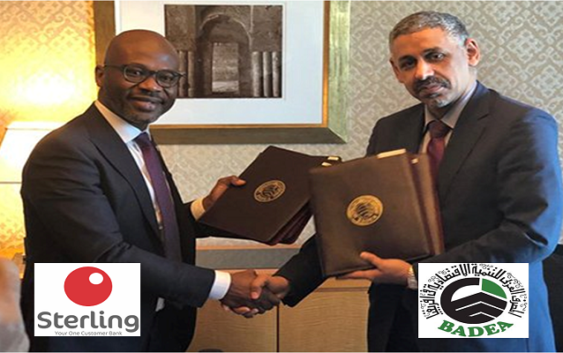- WORLD BANK KICK-OFF INSPECTION OF USMID PROGRAM IN UGANDA
- ALGERIA MINISTER RECIEVED HARBOR ENERGY CEO OVER ENERGY PARTNERSHIP
- CAN INNOVATION OUTRUN DROUGTH IN MOROCCO ONGOING WATER MANAGEMENT CRISIS
- SCZONE SIGNED DEAL WITH CHINESE INVESTORS FOR IRON PRODUCTS PROJECTS IN EGYPT
- WESTPROP HOLDING LIMITED SET TO EMBARKED ON PIPELINE PROJECT IN ZIMBABWE
STERLING BANK SIGNS US$65 billion LOAN DEAL WITH BADEA

Sterling Bank and The Arab Bank for Economic Development in Africa (BADEA) signs US$65 billion deal
Nigerian Bank, Sterling Bank have signed a deal to receive a US$65 billion loan facility from The Arab Bank for Economic Development in Africa (BADEA).
According to Sterling Bank’s Executive Director, Corporate & Investment Banking Mr. Yemi Odubiyi, the US$65 billion loan will come in two batches, US$15bn and US$50bn. Firstly, the US$15bn will be for financing private sector projects through on-lending to customers; while the US$50bn will be for financing Arab exports to African importers. The latter is a part of BADEA’s programme for financing foreign trade.
Signing ceremony of two loan agreements between BADEA and Sterling Bank Plc (Nigeria) totaling of 65 M. US$
H.E. Dr. Sidi Ould TAH, signed on behalf of BADEA, while Mr. Adeyemi Odubiyi, signed on behalf of Sterling Bank PLC.#AfroArabCoop @BADEAbank @Sterling_Bankng #Nigeria pic.twitter.com/iRvusD84dt— BADEA (@badeabank) February 18, 2019
Representing BADEA at the loan deal signing in Cairo, Egypt was its Director-General, Dr. Sidi Ould TAH.
Dr. TAH said the agreement is only just the beginning of cooperation between BADEA and Sterling Bank. Also according to him, the cooperation between both entities will help boost the participation of private sector in Nigeria’s economic and social development. As private sector will contribute more to the mobilisation of production and service sectors.
Mr. Yemi Odubiyi of Sterling Bank said, the second loan of US$50bn will be for bringing Arab goods and products to Nigeria. He also added that this will be made possible through on-lending to beneficiaries in the country. This will also help the growth of Arab exports in sub-Saharan Africa as there will more trade between Arab and African countries.

